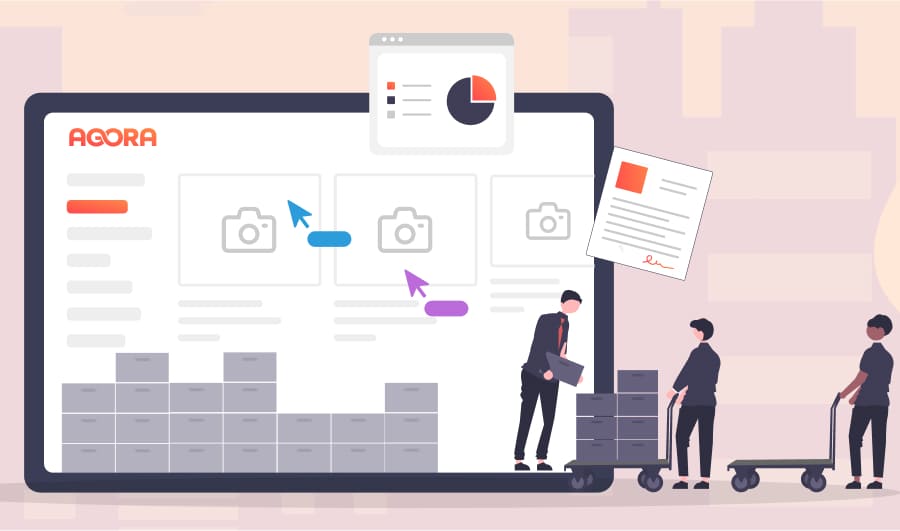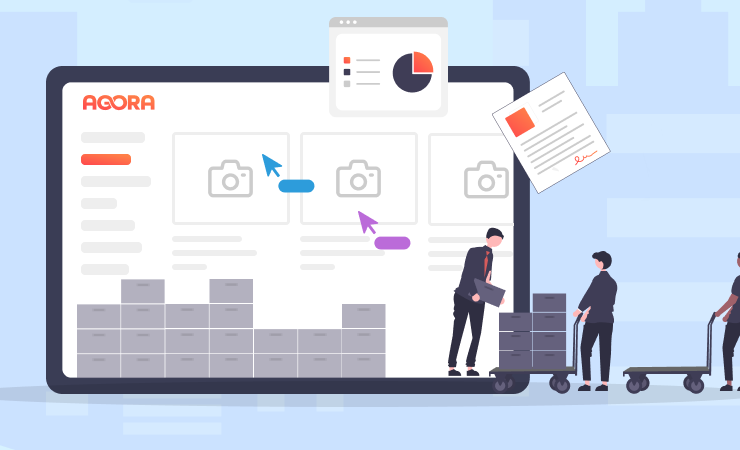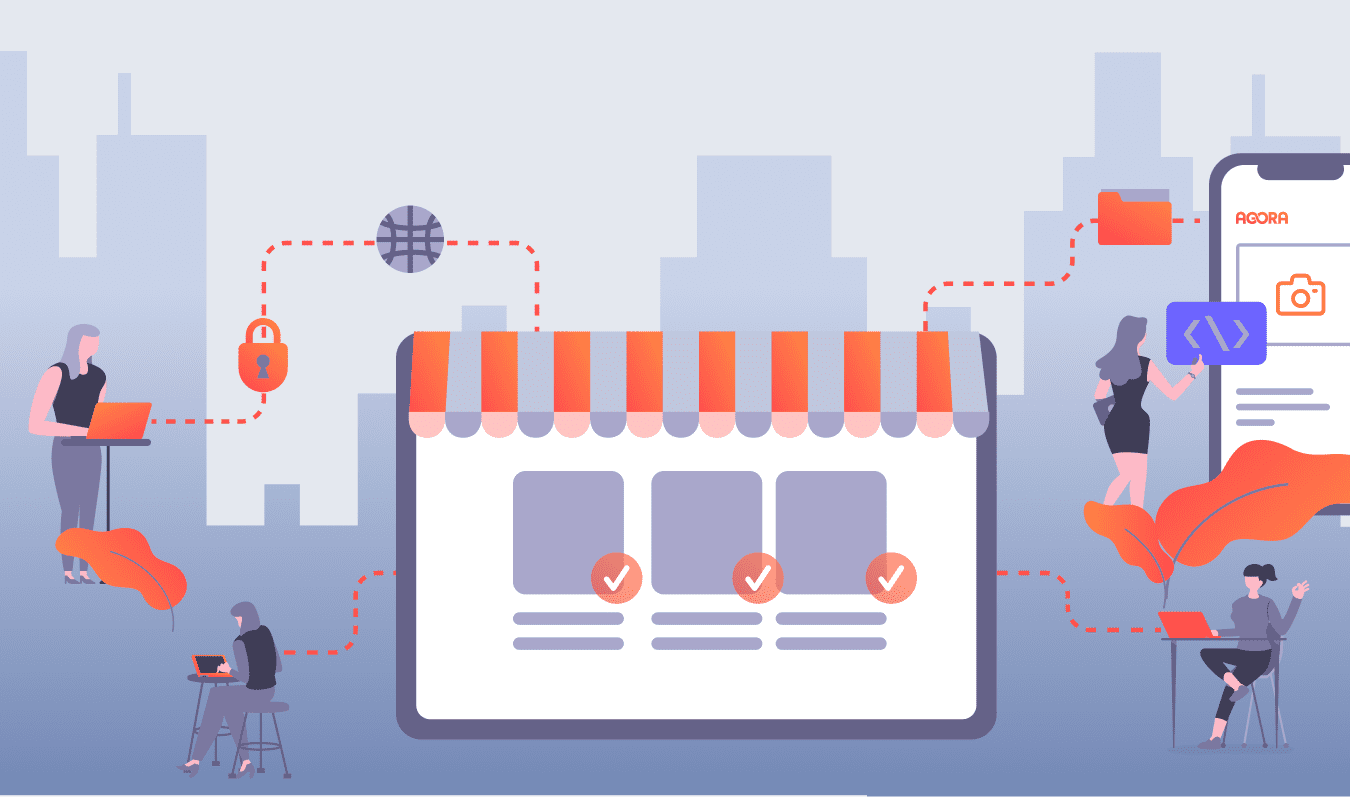
Characteristics and stages of B2B sales
B2B wholesale business is actively exploring online sales, which brings good results. In the US market, going online results in a more than 50% increase of annual profit, with doubling of the sales rate.
Let’s see what B2B sales is, what are their special characteristics, and what benefits do wholesale companies get from transitioning to online platforms.
B2B sales: what is it?
B2B sales includes the sale of goods or services to wholesale and retail customers. The corporate sales market is distinguished by the following points:
- purchased products are used by buyers as materials or equipment in order to produce new goods or offer new services (for instance, enterprise’s machines);
- supplier’s services are used by a client’s company for its own business (e.g. engaging a third-party cargo transport company to deliver goods to customers);
- goods are purchased by large scale intermediaries with the aim of reselling in smaller lots;
- customers are mainly companies, enterprises or organizations, not individuals as in B2C.
Characteristics of B2B sales
In contrast to B2C, where customers being in the same position purchase goods at retail, in B2B e-Commerce customers require special conditions.
Characteristics:
- According to the Pareto principle, interaction with 20% of customers who bring 80% of profit is often based on personal relationships.
- Services to the remaining 80% of customers involves considerable transaction costs, starting from communication and development of special pricing to accompanying documents.
- The majority of clients are regular, and it is necessary to maintain permanent contact with them in order to track their activity and establish regular cooperation. These processes are expensive for a supplier company, but losing customers is even more expensive.
- Client’s contact with supplier doesn’t always end by reaching a deal, while supplier’s managers spend a significant part of their time servicing each request.
- Every B2B client requires special conditions. You need to personalize the assortment, prices, discounts, terms of shipment and payment, formation of an order, accompanying documents. All this constitutes the supplier’s operational costs.
- There are different types of payment: prepayment, post-payment, payment for a specific quantity of goods. Payment may be deferred, divided into parts or carried out in different currencies, in case the company operates in foreign markets.
- The required content of the B2B catalog may differ depending on the field. For instance, in the field of building materials and electrical engineering client companies may request catalogs with retail prices and with the possibility of adjusting a markup in order to present a commercial proposal to a client. At the same time, the company expects to make a profit by virtue of the wholesale discount provided by the supplier.
- The supplier’s B2B catalog is often used by managers of purchasing company to demonstrate it to clients. In this case, the managers show retail prices to the clients, then place an order for the client.
- In some areas, buyers need to provide an estimate for their clients.
- The characteristics of B2B sales make them a much more complex process comparing to the retail sale of any product. It means that B2B sales provide more opportunities for optimization. AGORAB2B B2B portal is designed to avoid unnecessary expenditure of resources and reduce company’s dependence on sales managers.
B2B Sales stages
The classic scheme of wholesale sales in B2B market consists of several stages:
- A client addresses a supplier and consults a manager about product features, delivery conditions and prices.
- The manager provides the buyer with a personal B2B catalog with the necessary assortment, minimum quantity of goods suitable for the buyer, individual prices and discounts depending on the size of an order.
- Availability of products in the supplier’s warehouse is checked.
- The next step is confirmation of individual terms of delivery. An order can only be sent if there is a specific item: for instance, construction materials are only shipped if the appropriate fasteners are available.
- An order is formed, the products of the order are booked or ordered from the supplier, the date of delivery is displayed to the client.
- The contract and accompanying documents for the order are prepared.
- The supplier issues an invoice and a universal transfer document.
- The buyer makes payment or confirms its execution in the future: for instance, provides a letter of guarantee.
- The order is collected. At this stage there may be delays due to the lack of required products in stock.
- Products are shipped and delivered to the customer.
- Related services are provided: late payment and debts are checked, act of reconciliation is issued, a product catalog, promotional materials, etc. are offered.
The B2B portal from Agora.ru helps automate and accelerate the stages of B2B sales. Thanks to this solution, the buyer receives most of the data in a ready-made form with no need to involve the supplier’s sales managers.
- After setting up the catalog assortment, product units, prices and discounts will be personalized for a specific client or group of clients.
- The availability of products in the warehouse is automatically confirmed by the supplier’s accounting system (for instance, SAP) that is connected to the B2B portal. At this stage of B2B sales you can place an order and book products, individuall terms of delivery are automatically confirmed by the system.
- The invoice, contract and related documents are automatically created by the B2B portal: the buyer only needs to download them. Payment confirmation can be automatically carried out at this stage of B2B sales.
- While the order is being collected and products are being shipped, the client can independently check the information on delays and debts, order the acts of reconciliation, export the electronic catalog, request promotional products or download layouts for printing.
Summary
Thus, the peculiarities of B2B sales turn them into a complex process constantly involving supplier’s managers. AGORAB2B B2B portal allows to reduce company’s dependence on managers, free their time and concentrate it on the search for potential customers and development of the client base.
Besides, AGORAB2B B2B portal also allows:
- to monitor automatically the online behavior of customers, accumulating data on the so-called abandoned cart and any actions taken in the catalog or with products;
- to analyze the received data on customers’ activity and identify bottlenecks in the sales funnel;
- to launch special offers for customers who perform a certain action: for instance, an email campaign for abandoned carts or offering discounts on interesting products for customers who haven’t visited the catalog for a long time;
- to analyze procurement in order to determine what products are in demand, quickly dispose of illiquid assets, increasing warehouse turnover;
- to quickly update the assortment of goods and quickly provide the information on this for purchasing companies along the whole chain of dealers reselling goods, if all of them use the B2B portal;
- buyers to quickly book goods and use the supplier’s warehouse as their own virtual catalog, that they can offer with retail prices to their own dealers;
- release managers from routine operations, reduce supplier’s dependence on their actions and concentrate the released resources on the development of the client base.
Ready-made functionality of the B2B solution from AGORAB2B includes all of this.
Also read


